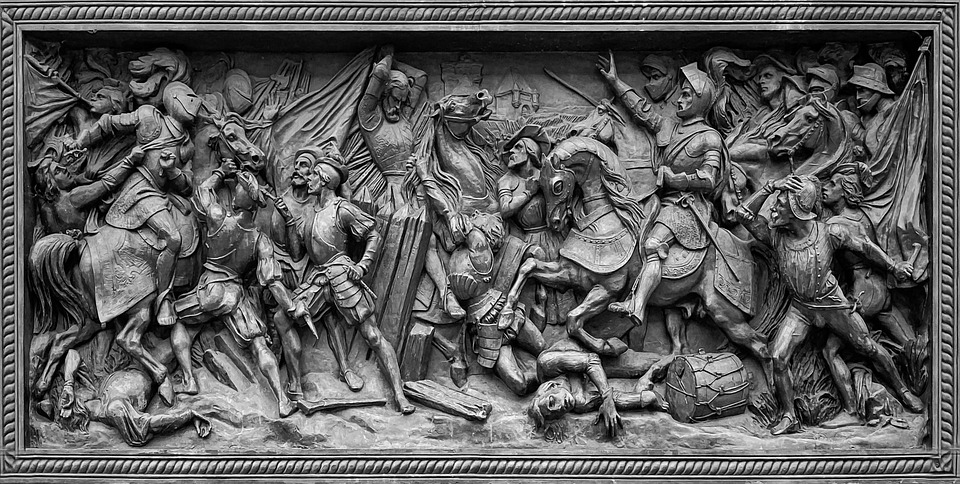In this article, Curtis Large explores the nature of British-Southern relations since 1946, particularly in the context of the “Special Relationship” between the United States and the United Kingdom. The article delves into three key areas: military and diplomatic links, attitudes towards civil society, and economic interactions. Large argues that while there are shared strategic connections and occasional friction, the most evident manifestation of any special relationship between Britain and the American South is seen in bilateral trade, despite other political differences and challenges.
Introduction
On 15 July 2018, then-President Donald Trump declared relations between the United States and the United Kingdom to be at ‘the highest level of special’.[1] In doing so, he appeared to bolster the age-old Atlanticist tradition which argues that the two nations share ‘unusually close institutional bonds, frequent consultation and concerted policies’.[2] So ubiquitous are mentions of a ‘Special Relationship’ that its existence is taken for granted by the casual observer. This sees the concept perceived through a narrow foreign policy lens, indicating total symmetry between the powers due to their strategic alliances in every major conflict since World War II.
However, little attention has been applied to determine if this theorised phenomenon extends beyond policymakers in London and Washington, or ‘groups of American East Coast Anglophiles’.[3] Few if any communities have been so overlooked in this respect as the American South. Historically a distinct political region in its own right, the purpose of this piece is to offer some commentary regarding the nature of British-Southern relations since 1946, the year Winston Churchill coined the term.[4] To do this, my essay will focus on three key areas: military and diplomatic links, attitudes towards civil society, and economic interplay.
I argue that while their strategic connections are unexclusive and that respective approaches to the challenges of race, crime, and punishment have caused them friction, if there does exist a Special Relationship between Britain and the South, it is evinced most clearly in bilateral trade.
Military and Diplomatic Links
Despite the UK embodying just one of the US’ military partners, albeit the most crucial, during both the Gulf War (1990–1991) and the first invasion of Iraq (2003), the South embraced these coalitions to a greater extent than any other American region. Whether this was down to what Alexis de Tocqueville diagnosed as Southerners being ‘passionately fond of hunting and war’ is debatable.[5] Whatever the catalyst, ‘while antiwar rallies flourished in cities like Boston, New York, and San Francisco, the South had patriotic parades in support of the troops’.[6] Meanwhile, those cities hosting demonstrations were also those traditionally aligned with Anglophile sentiments. These citizens relegated any affinity for martial co-operation in favour of neutral pacifism, apparently disinterested in the ententes that had previously bound the two states.
The South, having avoided such fracture, now accommodates British consulates in Atlanta, Houston, and Miami, with auxiliary offices in Dallas, Raleigh, and San Antonio. According to the UK Government, each deal ‘with a wide range of political, commercial, security and economic questions of interest to the UK and this region of the United States’.[7] The UK’s commitment therefore not only recognises the South as an autonomous land with its own political identity, important for healthy relations with what was a secessionist Confederacy,[8] but sees its alignment as significant enough to work for the sole benefit of a foreign order.
A significant caveat in analysing both Southern support for coalition militarism, as well as Britain’s diplomatic presence in the South, is that neither of these ties is exclusive. The idea that a Special Relationship motivated enlistment in the region is spurious. Equally, most UK envoys in America are located outside of the South, with the maximal Embassy headquartered in Washington.[9]
Attitudes Towards Civil Society
But this should not characterise the British political establishment as being interested in the region only because it is part of the US. During the latter half of the 20th-century, Britain’s left-wing expressed great curiosity about the peculiar social conditions of the South. Although much of this intrigue was founded on cluelessness–future MP Tony Benn noting on his 1947 arrival into Austin that ‘one’s first day in the real South presents a temptation to look round for a type’–serious intrigue persisted.[10] Particularly widespread was opposition by Brits to its racial segregation. This was exemplified in protestors ranging from Bertrand Russell to a group of Welsh miners, who, upon the failure of Paul Robeson to obtain an American passport in 1950, assembled a parade float which depicted a lynching by the Ku Klux Klan.[11]
However, such instances do not speak to attitudes regarding the UK among the Southerners themselves. In fact, it was the Labor Director of the NAACP, the American Herbert Hill, who complained in 1959 of ‘the high incidence of police brutality toward black residents, the poor living conditions endured by immigrants, and the inaction of local white liberals’ – after a tour of London.[12] Both Britain and the South were and are mired by troubling racial imbalances, common ground which at the same time has frustrated solidarity owing to mutual disapproval.
For all of this coincidence, its implications for any British-Southern Special Relationship remain unclear. Certainly, overt differences in political outlook do persist. The most notable of these is a divergent stance towards crime and punishment. This reached its zenith in 1995 with British attempts to stop the execution of English-born Nicholas Ingram at the Georgia Diagnostic and Classification Center. Attracting petitions for clemency from no less than 53 Westminster MPs, Ingram was killed regardless.[13] As the incumbent UK Prime Minister John Major conceded ‘with deepest regret, that there [were] no proper grounds for the British Government to intervene with the State of Georgia’,[14] the Southern polity distanced itself from Britain by acting against the pleas of some of its highest officeholders.
Economic Interplay
Despite this tension, political units need not enjoy complete agreement in order to interact for mutual reward. Of this Britain and the South take full advantage, with Texas standing as a principal beneficiary. UK foreign direct investment (FDI) is the highest of any nation in the Lone Star State, comprising 22% of its total FDI income. Amounting to $23.5 billion, this alone was responsible for the creation of 87,800 Texan jobs between 2009 and 2013.[15]
Natural resources and low tax rates have similarly made the wider South a fertile prospect for British funding. Whether because of Florida’s cheap property, North Carolina’s suitability for innovative start-ups, or South Carolina’s establishment of a UK trade mission, money from Britain has infiltrated virtually every sector of the Southern economy.[16] The benefits have been considerable even among the less prosperous states in the region. Alabama, for instance, has experienced an overall growth in its exports of both goods and services across the pond in recent years. This has sustained 6,100 employees and allowed the Cotton State to become a respectable stakeholder within Britain’s international trade.[17]
Conclusion
In 1956, Liverpudlian John Lennon heard the voice of Mississippian Elvis Presley for the first time. It is a fitting allegory for the contemporary state of British-Southern relations: ‘Suddenly there’s this hillbilly hiccupping on tape echo … we didn’t know what the hell Presley was singing about … To us, it just sounded like a noise that was great’.[18] Just as British leftists like Tony Benn had arrived in the South looking for ‘a type’, or how the country’s elite had expectantly pleaded with Georgia to stay the execution of Nicholas Ingram, interactions are often defined by a kind of naïve presumptuousness.
More supportive of the case for a Special Relationship, however, are the economic ties that continue to enrich the two parties. Those deliberate and unambiguous links that were created most organically between them, namely of shared financial gain, have fostered stronger connections overall than any strategic or societal initiative since Victory in Europe Day. And although in other matters harmony has not been abundant since 1946, this trade-based reciprocity hints that there does survive the potential for a wider and deeper alliance.
Perhaps now this is the platform from which a more profound understanding between the ordinary peoples of Britain and the South can be achieved, one which for decades was needlessly complicated by a longstanding lack of direct and sympathetic contact.
References
[1] Quoted in Walker, Peter (13 July 2018). ‘“The Highest Level of Special”: Trump Praises US Relationship with the UK’. Retrieved from The Guardian on 1 August 2023: https://www.theguardian.com/us-news/2018/jul/13/the-highest-level-of-special-trump-praises-us-relationship-with-uk
2 Colman, Jonathan (2004). A ‘Special Relationship’?: Harold Wilson, Lyndon B. Johnson and Anglo-American Relations ‘At the Summit’, 1964–68. Manchester: Manchester University Press. p. 1.
3 Hathaway, Robert M. (1990). Great Britain and the United States: Special Relations Since World War II. Boston, MA: Twayne Publishers. p. xvi.
4 Colman 2004, p. 2; Woodard, J. David (2013). The New Southern Politics. 2nd ed. Boulder, CO: Lynne Rienner Publishers. p. 1.
5 Tocqueville, Alexis de (2007) [1835–1840]. Democracy in America. J. P. Mayer (ed.), George Lawrence (trans.), Scott A. Sandage (abr.). New York: Harper Perennial. p. 331.
6 Woodard 2013, p. 367.
7 UK Government (2023a). ‘British Consulate General Atlanta’. Retrieved from the UK Government on 1 August 2023: https://www.gov.uk/world/organisations/british-consulate-general-atlanta
8 Woodard 2013, p. 5.
9 UK Government (2023b). ‘British Embassy Washington’. Retrieved from the UK Government on 1 August 2023: https://www.gov.uk/world/organisations/british-embassy-washington
10 Benn, Tony (1994). Years of Hope: Diaries, Letters and Papers, 1940–1962. Ruth Winstone (ed.). London: Hutchinson. p. 119.
1[1] Wilford, Hugh (2003). ‘The South and the British Left, 1930–1960’ in Franklin T. Lambert (ed.) Britain and the American South: From Colonialism to Rock and Roll. Jackson, MS: University Press of Mississippi. pp. 163–64.
12 Quoted in Wilford 2003, p. 167.
[1]3 Smothers, Ronald (8 April 1995). ‘British-American is Executed in Georgia’. The New York Times. p. 7. Retrieved from The New York Times Archive on 1 August 2023: https://www.nytimes.com/1995/04/08/us/british-american-is-executed-in-georgia.html
[1]4 Quoted in ibid.
[1]5 Collins, Savannah; Smith, Taylor; Walsh, Molly; Castellon, Michael (August 2015). ‘U.K. Leads Foreign Investment in Texas – Selling Texas by the Pound’. FiscalNotes. Retrieved from the Texas Comptroller of Public Accounts on 1 August 2023: https://comptroller.texas.gov/economy/fiscal-notes/2015/august/investment.php
[1]6 Barrett, Frank (27 February 1993). ‘Why the British Flock to Florida’. Retrieved from The Independent on 1 August 2023: https://www.independent.co.uk/travel/travel-why-the-british-flock-to-florida-1475493.html; Office of the US Trade Representative (2017). ‘North Carolina Trade Facts’. Retrieved from the Office of the US Trade Representative on 1 August 2023: https://ustr.gov/map/state-benefits/nc; South Carolina Department of Commerce (2017). ‘Trade Mission to the United Kingdom’. Retrieved from the South Carolina Department of Commerce on 1 August 2023: https://www.sccommerce.com/events/trade-mission-united-kingdom
[1]7 UK Government (2017). ‘Alabama and the United Kingdom – Trade and Investment Highlights’. Retrieved from the UK Government on 1 August 2023: https://web.archive.org/web/20190724070439/https://assets.publishing.service.gov.uk/government/uploads/system/uploads/attachment_data/file/597794/Alabama_State_Report.pdf
[1]8 Quoted in Ward, Brian (2003). ‘“By Elvis and All the Saints”: Images of the American South in the World of 1950s British Popular Music’ in Franklin T. Lambert (ed.) Britain and the American South: From Colonialism to Rock and Roll. Jackson, MS: University Press of Mississippi. p. 203.
Featured Image: Theresa May with President Donald Trump at the White House. Courtesy of Jay Allen (Crown Copyright)





